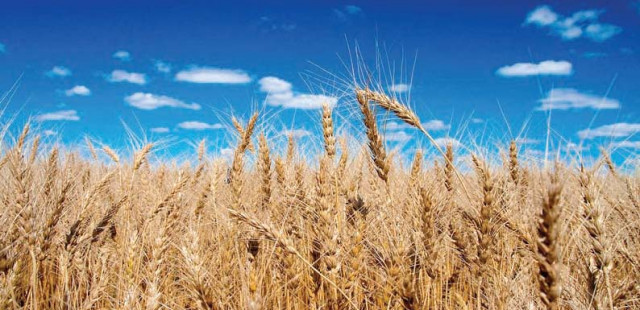Agricultural reforms: In two years wheat yield must rise to 29 million tonnes
Federal allocation for higher education was a breath of fresh, says UAF Vice Chancellor.

Federal allocation for higher education was a breath of fresh, says UAF Vice Chancellor. PHOTO: FILE
The government intends to introduce reforms and undertake new interventions in the agriculture sector to enhance the productivity, Farrukh Javed, the provincial minister for agriculture, said on Saturday.
He was speaking at a briefing session at the University of Agriculture Faisalabad’s (UAF) Syndicate Hall.
Javed said climate change was a big challenge. “Pakistan is more vulnerable to climate change than other countries in the region,” he said.
The minister praised UAF engineers for designing an efficient biogas plant to fuel tube-wells.
He said he would promote the project at provincial level. He also expressed his willingness to set up a new platform to bring institutions and organisations together for completing various projects.
Javed said the Punjab government had revived the district agricultural advisory committees. He said the government was looking forward to bringing all stake holders on board to formulate a progressive policy.

He said he would inspect agricultural lands of small farmers to monitor the contribution of extension staff.
UAF Vice Chancellor Prof Iqrar Ahmad Khan said the federal allocation for higher education was a breath of fresh air. He said the academia welcomed the government’s pro-education initiatives.
Khan said “We need to promote oilseed crops in the country to cut the $3billion edible oil imports.”
He said a high percentage of citrus trees had been affected by various diseases resulting in reduced productivity.
“We need to transform the nurseries in live with international trends,” he said.
“The UAF intends to open campuses in the north Punjab and the rice belt to transform the cropping cycles and bring new interventions for higher productivity and profitability,” he said.
In the last five years, he said, the number of first degree courses at UAF had gone from 11 to 23. He said financial assistance cover had gone up from 10 per cent in 2008 to 26 per cent.
“We need to produce 29 million tonnes of wheat in the next two years to feed the growing population,” he said.
He stressed the need for intervention in different cropping cycles, and making tangible interventions to enhance the farmers’ profitability.
He said UAF scientists had identified 10 mango varieties to be marketed globally.
“We are producing graduates who can market their skills in a competitive world”, he said.
Published in The Express Tribune, June 16th, 2013.



















COMMENTS
Comments are moderated and generally will be posted if they are on-topic and not abusive.
For more information, please see our Comments FAQ